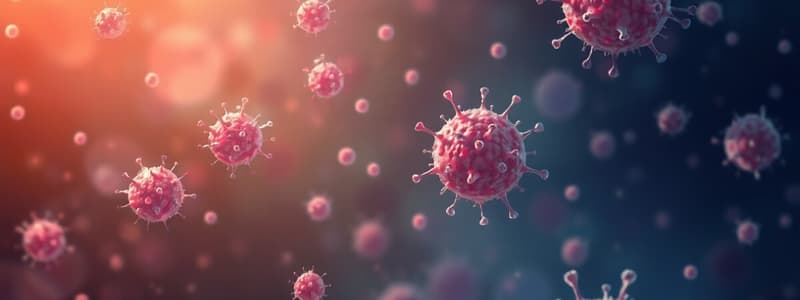Podcast
Questions and Answers
What was the total number of patients infected between January 2010 and January 2015 across the reported states?
What was the total number of patients infected between January 2010 and January 2015 across the reported states?
- Ten (correct)
- Fifteen
- Twelve
- Eight
What is the most common form of invasive disease associated with Listeria monocytogenes in healthy adults?
What is the most common form of invasive disease associated with Listeria monocytogenes in healthy adults?
- Gastroenteritis
- Meningitis (correct)
- Pneumonia
- Septicemia
Which treatment is considered bactericidal for Listeria monocytogenes?
Which treatment is considered bactericidal for Listeria monocytogenes?
- Amoxicillin
- Erythromycin
- Vancomycin
- Trimethoprim-sulfamethoxazole (correct)
Which diagnostic test is used for epidemiological tracking of Listeria monocytogenes?
Which diagnostic test is used for epidemiological tracking of Listeria monocytogenes?
What challenge is primarily associated with combatting Listeria monocytogenes?
What challenge is primarily associated with combatting Listeria monocytogenes?
What is the primary cause of early onset neonatal disease related to Listeria monocytogenes?
What is the primary cause of early onset neonatal disease related to Listeria monocytogenes?
Which of the following is an often asymptomatic presentation of Listeria infection in healthy adults?
Which of the following is an often asymptomatic presentation of Listeria infection in healthy adults?
What is essential for preventing outbreaks of Listeria monocytogenes?
What is essential for preventing outbreaks of Listeria monocytogenes?
What is the shape and arrangement of Listeria monocytogenes bacteria?
What is the shape and arrangement of Listeria monocytogenes bacteria?
Which high-risk population group is particularly vulnerable to Listeria monocytogenes infections?
Which high-risk population group is particularly vulnerable to Listeria monocytogenes infections?
How does Listeria monocytogenes escape from the phagolysosome?
How does Listeria monocytogenes escape from the phagolysosome?
Which of the following best describes the motility of Listeria monocytogenes?
Which of the following best describes the motility of Listeria monocytogenes?
What is the estimated number of Listeria infections annually in the US?
What is the estimated number of Listeria infections annually in the US?
What method does Listeria monocytogenes use to enter host cells?
What method does Listeria monocytogenes use to enter host cells?
What type of bacteria is Listeria monocytogenes based on its oxygen requirement?
What type of bacteria is Listeria monocytogenes based on its oxygen requirement?
What significant outbreak of Listeria occurred in the US in 2011?
What significant outbreak of Listeria occurred in the US in 2011?
Flashcards
Listeria monocytogenes
Listeria monocytogenes
A significant pathogen affecting animals and humans, often transmitted through contaminated food.
Gram-positive rods
Gram-positive rods
The shape of Listeria monocytogenes bacteria under a microscope.
Intracellular pathogen
Intracellular pathogen
A type of pathogen that lives inside host cells.
Infection Mechanism
Infection Mechanism
Signup and view all the flashcards
High-Risk Populations
High-Risk Populations
Signup and view all the flashcards
Phagolysosome Escape
Phagolysosome Escape
Signup and view all the flashcards
Motile at room temperature
Motile at room temperature
Signup and view all the flashcards
Estimated annual infections (US)
Estimated annual infections (US)
Signup and view all the flashcards
Listeriosis in newborns
Listeriosis in newborns
Signup and view all the flashcards
Listeriosis in adults
Listeriosis in adults
Signup and view all the flashcards
Listeriosis diagnosis
Listeriosis diagnosis
Signup and view all the flashcards
Listeriosis Treatment
Listeriosis Treatment
Signup and view all the flashcards
Listeriosis Prevention
Listeriosis Prevention
Signup and view all the flashcards
Gram Stain
Gram Stain
Signup and view all the flashcards
Infection Transmission (Newborns)
Infection Transmission (Newborns)
Signup and view all the flashcards
Ubiquitous Nature (Listeriosis)
Ubiquitous Nature (Listeriosis)
Signup and view all the flashcards
Study Notes
Listeria Monocytogenes Overview
- Listeria monocytogenes is a significant pathogen affecting animals and humans, particularly high-risk groups, through contaminated food.
- The guide covers the characteristics, pathogenesis, epidemiology, clinical manifestations, laboratory diagnosis, and treatment/prevention strategies.
Key Characteristics
- Morphology/Physiology: Gram-positive rods; arranged in pairs or short chains; facultative anaerobe (survives with or without oxygen); grows over a broad temperature range; exhibits weak beta hemolysis and salt tolerance; motile at room temperature; intracellular pathogen - lives inside host cells
Pathogenesis and Immunity
- Survival Tactics: Survives stomach acids, enzymes, and bile.
- Cell Entry: Attaches to E-cadherin via Internalin A; enters cells.
- Phagolysosome Escape: Utilizes listeriolysin O and phospholipases.
- Cellular Movement: Manipulates host cell cytoskeleton to move to neighboring cells using actin as a propeller.
Epidemiology
- Distribution: Found in the environment and feces of mammals, birds, fish, and insects.
- Estimated Infections (US): Approximately 2,500 cases annually.
- High-Risk Populations: Neonates, elderly, pregnant women, and immunocompromised individuals.
- Outbreaks: Significant past outbreaks; 2011 caused 147 infections and 33 deaths across 28 US states. Data from 2010-2015 shows 10 cases and 3 deaths in 4 states.
Clinical Diseases
- Neonatal Disease: Early onset (transplacental transmission) causing severe outcomes; late onset (post-birth) causing meningitis and septicemia.
- In Healthy Adults: Often asymptomatic or presents mild flu-like illness; invasive infection (meningitis) is common.
Laboratory Diagnosis
- Gram Stain: Not typically detectable in cerebrospinal fluid (CSF), but grows on conventional media.
- Tests: CAMP test, nucleic acid tests, and pulsed-field gel electrophoresis (for epidemiological analysis).
Treatment, Prevention, and Control
- Treatment: Most antibiotics are bacteriostatic; trimethoprim-sulfamethoxazole is bactericidal.
- Prevention: Strict hygiene standards; regular monitoring of food products. Combating Listeria is difficult due to its ubiquitous nature.
Studying That Suits You
Use AI to generate personalized quizzes and flashcards to suit your learning preferences.



